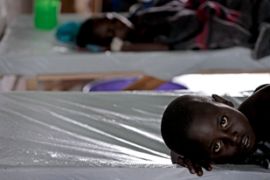Fresh fighting in eastern DR Congo
Rebels and pro-government militia accused of “war crimes” as fighting resumes.

The clashes came after a day of relative calm.
| Video | ||||||
|
Kgalema Motlanthe, the South African president, on Sunday called for a ceasefire between Congolese government forces and fighters from the National Congress for the Defence of the People (CNDP).
“We call for an immediate ceasefire to allow humanitarian assistance to the displaced people,” he said at the start of a Southern African Development Community (Sadc) summit.
“We firmly believe that there is no military solution to the problem.”
Hundreds of people are believed to have been killed in fighting between government forces and the CNDP, led by Laurent Nkunda, a renegade general.
More than a quarter of a million people have been displaced, the UN says.
Civilians ‘executed’
On Saturday, the UN said it had evidence that CNDP fighters and pro-government militias have killed civilians in the region.
Alan Doss, the senior UN envoy in DR Congo, said that “war crimes that we cannot tolerate” were committed in the village of Kiwanja, near Goma.
“We condemn them, we deplore them, and we remind the different groups involved that international law is very clear on this,” he said.
UN officials said that local fighters, known as Mai Mai, first attacked the villagers on Tuesday.
Fighters from the CNDP then won control of the village and killed those who they thought supported the Mai Mai.
The UN mission said on Friday its investigators had “visited 11 communal grave sites, containing at least 26 bodies, fighters and civilians”.
Executions
Anneke Van Woudenberg, a researcher with Human Rights Watch, and Dietrich said it appeared the rebels had committed many more killings than the militia.
Some residents told the Associated Press news agency that many victims were shot in the head, while others said the rebels dressed the dead in military uniforms.
The killings highlighted the inability of UN peacekeepers to protect civilians.
Monuc has a base in Kiwanja, but it has only 120 soldiers to protect up to 50,000 people.
 |
| Civilians are bearing the brunt of affects of the fighting [AFP] |
“We have tried our utmost to portect civilians wherever we can,” Doss told Al Jazeera.
“Please remember that this is a huge area. There are 10 million people in Kivu and we have less than 10,000 peacekeepers.
“In many places we are the only presence there to protect people. The situation would have been infinitely worse had we not been there.
“It is not the UN that is the root cause of these problems – it is the armed groups, and is some cases the national army, that is responsible for human rights violations. They must respect international law; they must put an end to the fighting.”
But Al Jazeera’s Mohammed Adow, reporting from Goma, said that the peacekeepers had had little success in protecting civilians.
“The UN has been sending teams to the battle scenes, but they can only stand around and watch as the fighting continues,” he reported.
“In Goma, the UN has only 850 personnel… They are outnumbered – there are thousands of rebels and thousands of government forces.”
Dietrich said that UN forces had been pinned down under crossfire for some of the first day of the killings and were hampered because militiamen were hiding in houses among civilians.
Peacekeepers had also been trying to stop CNDP attacks on two other towns, Nyanzale and Kikuku, while the killings continued on Wednesday.
Civilians flee
Thousands of people are still moving towards overburdened refugee camps, Adow reported.
“People in the camps are living in terrible conditions. There is no shelter left, so people are building shelters out of banana leaves – that is all they have to protect themselves from the rain.
“It has been raining every day for the last nine days. These people do not have clean water and they have nothing to treat the water that they use. Diseases like cholera have broken out.”
Aid is not reaching those who need it because government forces have closed roads acorss North Kivu province, Adow reported.
“People do not have food. Aid agencies have not only been caught unaware by the fighting – which is said by people to be among the worst ever – they have also been caught out by hijackings. Not much aid is getting to people.”
The UN estimates that about 253,000 people have been displaced since September.
The CNDP says it is fighting to protect the rights of ethnic Tutsis in DR Congo, while the country’s government has accused neighbouring Rwanda of aiding the rebels.
The Rwanda government denies that it has given any support to the CNDP, calling the crisis a purely Congolese problem.


